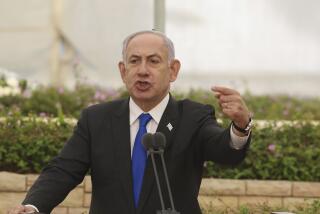Panel Says Iraq Has Illicit Arms Program
- Share via
UNITED NATIONS — The U.N. commission charged with destroying Iraq’s ability to wage chemical, biological and nuclear war has concluded that the Iraqis continue to hide a “small but significant” number of long-range missiles and, in all probability, chemical and biological warheads to go with them, according to officials here.
The disclosures came amid reports by a German newspaper Tuesday--downplayed by the U.S. State Department--that the United States is planning another cruise missile strike against selected targets in Iraq. The U.N. officials made no mention of an American attack, but said weapons inspectors have in the last two months been exasperated by increased obstructionism by Iraqi President Saddam Hussein, who apparently believes the U.N. Security Council is weakening in its support for the commission’s work.
Iraq has stepped up its efforts at concealment just as the panel, which was set up in 1991 by the cease-fire that ended the Persian Gulf War, has developed its clearest picture yet of Iraq’s weapons program, said Charles Duelfer, commission deputy chairman.
“Our understanding of how that concealment works has solidified over the past year so we have greater concern about what Iraq still has,” Duelfer said in an interview. “As we put the pieces together . . . we’ve drawn the conclusion that Iraq is retaining a coherent [weapons] program, not just bits and pieces that they failed to inform us about. . . . We remain concerned that the Iraqis have an operational missile force. If they have, then it’s likely they have warheads--both chemical and/or biological--to put on them.”
Duelfer’s comments were echoed by other U.N. officials and American experts.
Rolf Ekeus, the Swedish diplomat who chairs the commission, has estimated that Iraq retains a force of as many as 25 long-range missiles, which in theory could hit targets across the Middle East. Ekeus was in Germany on Tuesday, where the newspaper Frankfurter Allgemeine Zeitung, citing “American security sources,” said the United States was contemplating a Tomahawk missile launch into Iraq in response to the findings.
In Washington, State Department spokesman Nicholas Burns responded, “The United States always reserves the right to use its military force to defend its national interest anywhere in the world, but I see no reason to heighten your concern in any way pertaining to the situation in the Middle East.”
The U.N. commission was empowered by the Security Council to supervise the elimination of Iraq’s weapons of mass destruction and set up a monitoring system to prevent the country from rearming. In an effort to force Iraqi compliance, the Security Council has maintained economic sanctions against the country, including an embargo on most oil sales.
But Iraq generally has failed to cooperate.
“It’s been cat and mouse all the way, with them telling us one lie after another,” said one commission source. “They tell us one lie one week and another the next when we prove their first statement couldn’t be true.”
In its quest, the commission has sent divers to the bottom of the Tigris and Euphrates rivers to recover bombs and rocket parts, blown apart a biological weapons factory, and recovered 150 boxes of military files--more than 1 million pages--hidden at a chicken farm. The “chicken documents,” as they came to be called, were a treasure trove of information on biological, chemical and nuclear weapons development.
The commission maintains a rotating staff of 100 inspectors and support personnel in the Iraqi capital of Baghdad; a staging area in the Persian Gulf sheikdom of Bahrain; a fleet of helicopters donated by Chile and a U-2 spy plane supplied by the United States.
In its most recent clash with Iraq, inspectors have been blocked from removing missile engine parts to Huntsville, Ala., for testing by the U.S. Defense Department. The engines were dismantled by Iraq after the Gulf War, but the commission suspects some parts were salvaged for use in other missiles.
When Ekeus reported this problem to the Security Council in December, the council responded with a weaker-than-expected statement reminding Iraq of its obligations. Council sources indicated that Russia argued the Iraqi side during closed-door deliberations and that was one reason for the tepid nature of the action.
Ekeus will visit Moscow later this week, where he will meet with Russian Foreign Minister Yevgeny M. Primakov and seek renewed support for the commission.
At a Jan. 29 appearance sponsored by the Washington Institute for Near East Policy, Ekeus compared the Security Council action to a reminder of an overdue dentist’s bill and pointedly observed that immediately afterward Iraq grew more recalcitrant than ever.
“I think Iraq is totally wrong in its counting of the Security Council’s position,” Ekeus said. “But it shows how important this interplay is [between] what is going on in the field and the council.”
U.S. and U.N. officials said Hussein may be gambling that international support for sanctions eventually will crumble.
Russia is anxious for Iraq to get back into the oil exporting business so it can repay what Ekeus estimated is $7 billion it owes Russia for arms and other purchases. One U.S. official suggested that Russia’s maneuvers in the Security Council essentially are a gesture to Iraq and that Russia continues to back the sanctions. However, this week the Russian delegation to the U.N. circulated a proposal that would make it tougher to impose future sanctions on any country.
More to Read
Sign up for Essential California
The most important California stories and recommendations in your inbox every morning.
You may occasionally receive promotional content from the Los Angeles Times.













